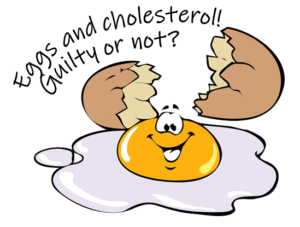 The perfect food?
The perfect food?
Eggs? Yes!
Many consider eggs to be “the perfect food” because there are so many nutrients jam-packed into such a small package!
However, eggs have also been considered a “villain” the past several decades after scientists decided that cholesterol in our food was bad for us! After this finding, food companies latched onto the opportunity to develop egg substitutes…which were marketed as providing all of the benefits of eggs, without the cholesterol.
What's the difference between REAL eggs and egg substitutes?
REAL eggs have one ingredient: eggs.
Pretty simple…the chicken lays them, the farmer gathers them, you pick them up at the store (or, ideally, at the farmers’ market), and they are in your kitchen ready to enjoy.
For egg substitutes, the ingredients can vary, but here are the ingredients in a common egg substitute:
 Egg Whites (99%), Less than 1% of the Following: Natural Flavor, Color (Includes Beta Carotene), Spices, Salt, Onion Powder, Vegetable Gums (Xanthan Gum, Guar Gum). Vitamins and Minerals: Calcium (Sulfate), Iron (Ferric Phosphate), Vitamin E (Alpha Tocopherol Acetate), Zinc (Sulfate), Calcium Pantothenate, Vitamin B2 (Riboflavin), Vitamin B1 (Thiamine Mononitrate), Vitamin B6 (Pyridoxine Hydrochloride), Vitamin B12, Folic Acid, Vitamin D3, Biotin.
Egg Whites (99%), Less than 1% of the Following: Natural Flavor, Color (Includes Beta Carotene), Spices, Salt, Onion Powder, Vegetable Gums (Xanthan Gum, Guar Gum). Vitamins and Minerals: Calcium (Sulfate), Iron (Ferric Phosphate), Vitamin E (Alpha Tocopherol Acetate), Zinc (Sulfate), Calcium Pantothenate, Vitamin B2 (Riboflavin), Vitamin B1 (Thiamine Mononitrate), Vitamin B6 (Pyridoxine Hydrochloride), Vitamin B12, Folic Acid, Vitamin D3, Biotin.
Yes, that's 20 ingredients! While the production process for egg substitutes is a bit of a mystery, we do know food companies purchase large amounts of eggs, which are trucked to a factory. There, the yolks are separated from the whites. Then, thickeners (like xanthan gum or guar gum) are incorporated to add body, coloring is added to give them a yellow appearance and nutrients are added back in to make up for the yolks being removed. Then, they are packaged into cartons, trucked to your local store…and finally ready to purchase and enjoy.
What about nutrition?
Nutritionally, eggs and egg substitutes are both good options. The main difference? The nutrients in eggs are natural and mostly contained in the yolk. The nutrients in egg substitutes are added in during processing to make up for the yolks being removed. Eggs do contain cholesterol and saturated fat, which generally aren’t found in egg substitutes.
An important concept to consider…one of the big problems in our nutrition scene is the focus on individual nutrients. Science has yet to identify (and may never identify) the benefits of nutrients interacting with one another when consumed through different combinations of REAL foods in their natural state! Or, look at it this way...you can't only focus on one individual player on the team, you have to look at how the entire team interacts together.
Should we still be concerned about cholesterol in eggs?
Despite the finding in the 1960s about cholesterol being bad for us, the nation’s top nutrition advisory panel has now determined that cholesterol in the diet is no longer considered a “nutrient of concern.” Without getting too much into the science of it, cholesterol is produced by our liver and transported through our blood stream. It's important for our bodies, but too much can cause heart disease. Experts now tend to agree that eating foods high in cholesterol does NOT significantly affect our blood cholesterol or risk of heart disease! Blood cholesterol is influenced more by saturated fats and trans fats (which of course, are found in many processed foods!)
Eggs are a powerhouse!
Eggs are loaded with nutrients including vitamins B12 and D as well as good fats and antioxidants. They also contain:
- Choline, which helps keep cell membranes functioning healthy and normal!
- Anti-clotting agent to help prevent heart attacks and strokes!
- Lutein, which can help your vision and prevent macular degeneration!
- Nutrients essential for helping with concentration, attention and memory retention…and to help prevent Alzheimer’s Disease!
Don’t let the “sat fat” scare you!
Eggs do contain saturated fat, but it is less than 2 grams and less than 10% of the recommended daily allowance. Because of how nutrient-rich eggs are, we shouldn’t worry about the small amount of saturated fat — we would be much better off reducing saturated fat elsewhere (such as in processed foods!). (Of course, there are certain individuals where limiting eggs may be important, especially people with certain health conditions.)
Weigh the differences!
- Egg substitutes can be more convenient…it can be easier to pour eggs out of a carton vs. using REAL eggs. But, realistically, cracking a REAL egg is still pretty convenient!
- REAL eggs have a longer shelf-life! Real eggs can last for 4-6 weeks (or more) while egg substitutes should be used within 7 days after opening.
- Don't forget taste! REAL eggs have a richer and more authentic taste, primarily because of the yolks!
In a culture surrounded by processed food-like products, egg substitutes are not as bad as other processed foods, but we still prefer the REAL deal!
It's just not the same!
Who can resist a home-cooked meal that includes an egg cooked golden brown – or poached – with a runny yolk? You can’t replicate THAT with egg substitutes! These and other incredibly tasty recipes wouldn’t be the same without a REAL egg:
 Brussels Sprouts Hash
Brussels Sprouts Hash- Polenta Bowl with Spinach, Sausage and Poached Egg...an Eat REAL America member recently called this “A killer recipe!”
- Egg Topped Roasted Asparagus Strawberry Salad
- Egg and Mushroom Sandwich with Basil Pesto...just to name a few!
One final thought…on buying eggs.
Buy eggs from local farmers when you can (where the animals run free), but when buying from the store, don't get too hung up on the differences and claims on the carton such as cage-free vs. free-range vs. organic vs. other types of eggs.
Go ahead and enjoy your eggs! An egg a day – on average – provides great nutrition, especially as part of a REAL food lifestyle!




Leave A Comment